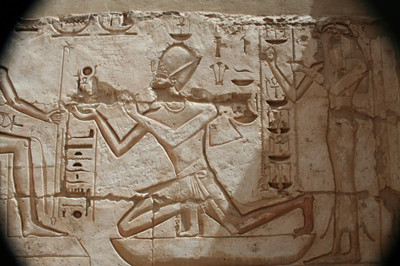There's something disturbingly familiar about this kind of image-it looks to us indeed a bit like a contemporary political cartoon, and so we showed it to the political cartoonist, Steve Bell, to ask him what he made of it:
类似这样的场面熟悉得令人不安,看上去几乎有点像是现代的政治卡通。于是,我们把这标签拿给政治漫画家史蒂夫?贝尔看,问问他的想法:
"Well, looking at this tiny object now, it is a genuinely archetypal image of power-it's the exercise of power, it's somebody bossing it over somebody else. And this image of having a larger character dominating a smaller character is obviously not to do with physical size, it's to do with symbolic size, symbolic weight, and that even carries on into the world of naturalistic political cartoons to this very day. I did it myself only yesterday. You find that characters you focus on often you draw bigger, just because that's where the meaning is. Here we are-one of the earliest political images of all time-it is quite something. There're no laughs there-but that comes later!"
“这小小的物品看起来,真的是一种权力的真正原型形象,代表权力的行使,一个人对别人的镇压。你看,这标签上是一个身形大得多的人在威吓一个身形较小的人,显然这并不是一种真实肉体上的体型差异,而是象征性的。这一点甚至当今政治漫画界仍然很自然运用着。我自己昨天才画过这种类型的。我们看到的是人类历史上最早的政治图像之一。这画面挺严肃的,没有什么笑点,不过那些都是后话了!”
The label-maker's job 'was' deadly serious-to keep his leader looking invincible and semi-divine, and to show that Den was the only man who could guarantee what Egyptians, like everybody else, wanted from their rulers-law and order. Within the pharaoh's realm, everybody was expected to conform and to take on a clear Egyptian identity. The message of our sandal label is that the price of opposition was high and painful. And the message is carried not only in images but by writing-there are some early hieroglyphs scratched into the ivory.
标签制造的工作可是有“致命”的重要性,得确保把他的统治者描绘成无往不胜的半神,也得表现出国王丹是唯一能为他的国家带来法律与秩序的人—古埃及人,像任何其他人一样,都希望他们的统洁者能做到这点。在法老的皇权下,人人都得遵从并体现出一种明确的埃及人身份特征。我们这枚凉鞋标签上传达出的信息是:强权镇压的代价是昂贵而痛苦的。这信息不仅仅通过画面表达出来,而且刻在牙牌上边的早期象形文字也说很清楚。



